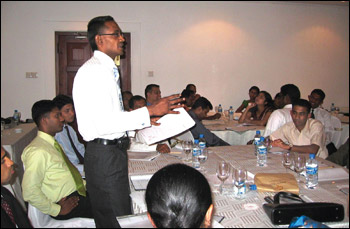Myths in tourism marketing
Vipula Wanigasekera
Tourism universities and institutions produce hundreds of marketing
professionals into the markets and industries and they enter the
business arena brimming with new concepts, strategies, ideas, and
tactics to turn things around to generate results overnight. Their
bosses eagerly await monthly P and L accounts thereafter.
Then the magic wand first hits the visible confusion arising over
entanglement in differently interpreted managerial and marketing terms
from vision, mission, objectives, strategies, tactics, communications,
promotions and branding colourfully appearing on screen which sometimes
tend to push aside a real need for a particular action, activity or even
a direction that may go begging for immediate attention.
|

Training session organized by the Sri Lanka Convention Bureau in
Kandy. |
The macro-environment is so uncertain, unpredictable and
uncontrollable. Tourism organizations can face difficulties when areas
that are not within their control hamper their plans. Not being geared
or prepared for elements emanating from unmanageable areas may force
organizations to halt or drop their plans that have no chance of being
pursued.
Often, the reason is the over enthusiasm without giving much thought
to operational hazards that should also be given due consideration at
preliminary discussions. It is always necessary to review why plans have
not proceeded as discussed.
Many middle managers initially fail to comprehend the cultures of
various organizations whether they are private or State, that are often
governed by the individualistic thinking of their superiors in spite of
detailed discussions on short and long term plans discussed from time to
time for collective decisions. Eventually, the subordinates become cogs
in the wheel and simply do ' what they are asked to do' to avoid the
wrath from the top.
At a time many countries are striving to come out of the recession
(some are succeeding while others are not so lucky), experts keep
hammering on the need to increase marketing activities, do things out of
the box, and exploit opportunities in the vacuum caused by competitors'
inaction. However many complain that marketing also increases cost and
not the ROI.
Others argue that doing any marketing at all, is better than doing
nothing, marketing must be smart enough to create a substantial ROI, or
otherwise it is said to be just a way to camouflage the act of throwing
thousand dollar bills out of the window. This raises the question the
extent to which tourism marketing is driven by rational and personal
preferences.
In tourism, advertising and promotions are expected to create
awareness and interest among the target audience or target market. When
they do not trigger direct business deals, the stakeholders begin to
question the correlation between the promotions and the generation of
business.
Marketing emphasizes educating the target market through advertising,
direct marketing, Internet marketing, events, public relations, or
networking. The surge that Sri Lanka expected soon after the war was
really seen in statistics so far but travellers have many other options
with the recession hitting their long haul travel. Is there anything
else to be done other than all the marketing gimmicks that are known and
widely practised today?
Will lower prices encourage more people to travel to Sri Lanka?. This
is argued both ways. The upscale traveller with adequate disposable
income would not mind as long as he or she realizes the expectations
promised through promotional efforts. The answer lies in the value of
the product to the visitor and not exactly the price. For others, Sri
Lanka is yet to offer the night life, entertainment etc as our
neighbours do.
Can too many options confuse the travellers?. The diversity in
compactness, just as much as a strength to any country, can pose a
difficult task for marketeers when allocating resources based on product
market strategies where the focus tends to get diluted. Do the research
studies precisely reveal exactly which product, is to be targeted at
which market and at any given time. This is doubtful in a vast
environment when every country is striving to have a reasonable share
from their markets.
Many DMCs and tour operators are experts in their ideas and
promotional approaches but their creativity sometimes goes waste when
the sale is dependent upon a middleman who acts as their agent overseas.
These agents have many countries in their catalogues and what Sri Lanka
can offer in terms of value is not truly reflected through a few
pictures and prices.
e marketing is said to be successful only if it is done purposefully.
Most emails are considered spam and deleted at first sight by receivers.
The e marketers say 'lots of email reach people who are not interested
in what you have to offer hence considered.
In the eagerness to use internet marketing for all businesses today
prospective customers should not be underestimated. But marketeers often
refer to "integrated marketing" plans because it is the integration of
many different types of activities that drive visitors to a web site.
Consistency is said to be tourism marketing's best friend provided
the product fulfils the promise. With the development of infrastructure,
Sri Lanka is expected to move away from the numbers game into more value
based tourism such as eco, spiritual, cultural and heritage tourism, as
it is unlikely that Sri Lanka's culture will ever warrant Sri Lanka
Tourism to be on par with her neighbours in terms of entertainment,
night life, etc. The vision of tourism being discussed at various fora
should take these realities into account.
Partnerships and alliances are extremely important for tourism
marketing.
At least policy makers tend to believe so, when they question why all
sectors that deal with overseas markets cannot join hands with tourism
and go along together for synergistic efforts and results.
The BOI, the EDB, the Tea Board and Foreign Missions were mentioned
as partners. For instance, ' Ceylon Tea' is carrying a very high level
of awareness throughout the world, a brand that Sri Lanka was gifted
with for decades. |



